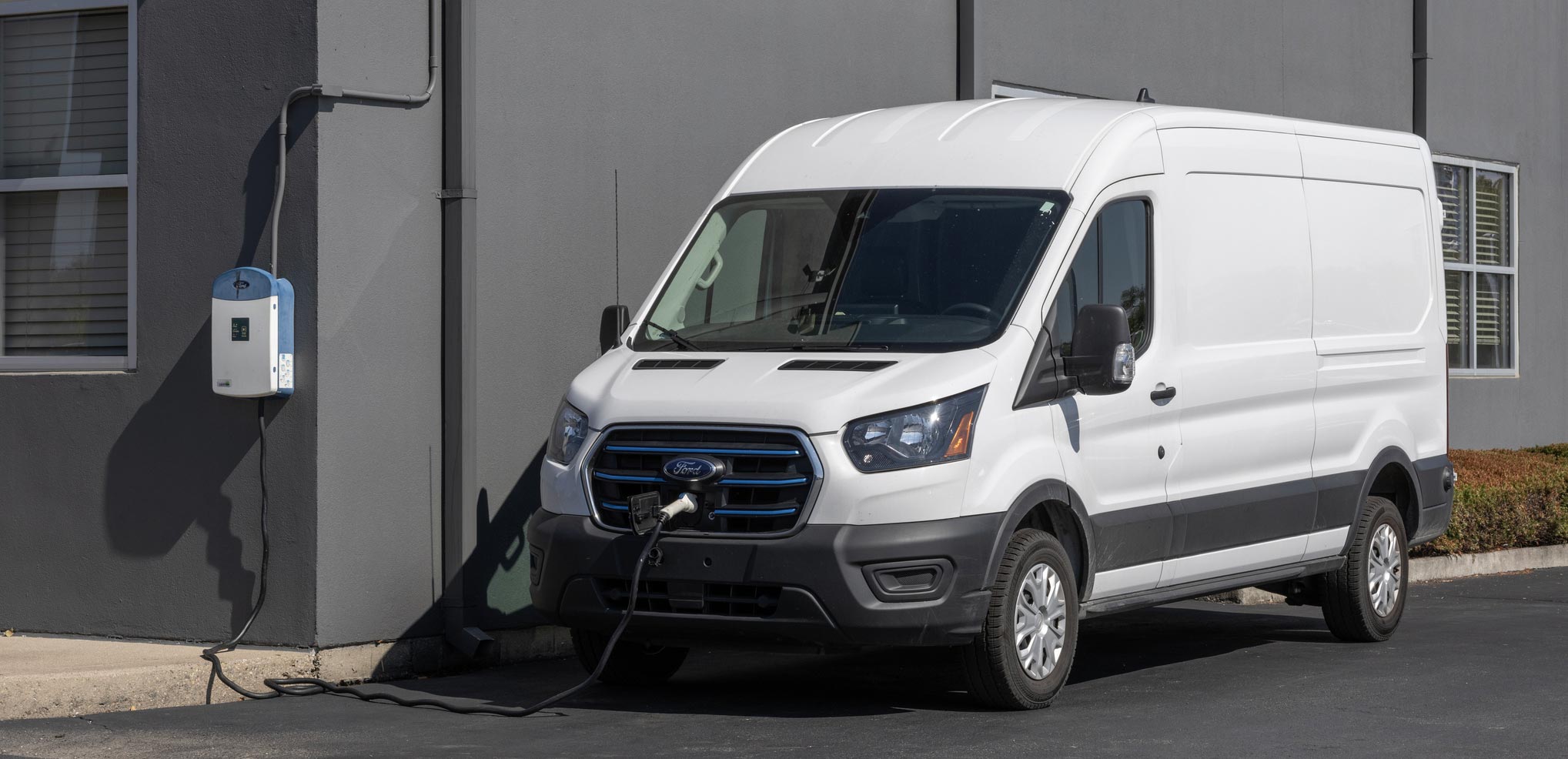
Fleet Electric Vehicle Total Cost of Ownership with and without Federal Tax Credits
This article uses a previous version of RMI’s fleet electric vehicle total cost of ownership (TCO) analysis. For the most up to date methods, data, and visuals, including TCO analysis with and without tax credits, please visit our Fleet Electric Vehicle Total Cost of Ownership with and without Federal Tax Credits webpage.
Updated RMI analysis demonstrates that electric vehicles are more economical for fleets across light- and medium-duty applications than equivalent fossil fuel vehicles. Even so, total cost of ownership (TCO) for EV fleet vehicles increases if federal commercial vehicle tax credits and charger tax credits are unavailable. Previous analysis has been updated with a wider range of fuel prices and the availability of federal tax credits.
Patrol cars

Image credit: Kevauto, under the Creative Commons Attribution-Share Alike 4.0 International license.
Without tax credits, the TCO for electric patrol cars remains higher than equivalent fossil fuel vehicles unless fuel prices surpass $3.75/gallon. With tax credits, the TCO for electric patrol cars is lower than equivalent fossil fuel vehicles and becomes even more economical as fuel prices rise.
Paratransit vehicles

Even without tax credits, the TCO for electric paratransit vehicles is lower than equivalent fossil fuel vehicles across the range of fuel prices modeled. With tax credits, the TCO for electric paratransit vehicles is even lower than equivalent fossil fuel vehicles. If the paratransit van traveled significantly less than the modeled 22,500 miles per year, the TCO advantage for the electric version would diminish.
Construction contractor vehicles

Without tax credits, the TCO for electric construction contractor vehicles remains higher than equivalent fossil fuel vehicles. With tax credits, the TCO for electric construction contractor vehicles is higher than equivalent fossil fuel vehicles until fuel reaches $3.75/gallon. These results should be considered very conservative if traveling more than 12,000 miles per year.
Private security vehicles

Without tax credits, the TCO for private security electric vehicles remains higher than equivalent fossil fuel vehicles. With tax credits, the TCO for private security electric vehicles is lower than equivalent fossil fuel vehicles and becomes even more economical as fuel prices rise.
Commercial delivery business

Without tax credits, TCO for large medium-duty delivery business electric vehicles remains higher than equivalent fossil fuel vehicles. With tax credits, TCO for large medium-duty delivery business electric vehicles is higher than equivalent fossil fuel vehicles but approaches parity when diesel fuel prices are $3.75/gallon. These results are somewhat conservative because it does not include the price of diesel emission fluid, and national average diesel prices have been over $4.00 for long durations in the recent past.
Methods
Analysis was performed using the DRVE Tool 2.0 built by Atlas Public Policy and Electrification Coalition. The total cost of ownership estimates do not presume that charging infrastructure is already available, and thus the TCO estimates include the cost of installing and maintaining one level 2 charger per vehicle. Electricity price inputs reflect the national average as of October 2024. Annual mileage inputs should be considered an average and not representative of every situation within a scenario.
Supporting information
Updated RMI analysis demonstrates that electric vehicles are more economical for fleets across light- and medium-duty applications than equivalent fossil fuel vehicles. Even so, total cost of ownership (TCO) for EV fleet vehicles increases if federal commercial vehicle tax credits and charger tax credits are unavailable. Previous analysis has been updated with a wider range of fuel prices and the availability of federal tax credits.

Image credit: Kevauto, under the Creative Commons Attribution-Share Alike 4.0 International license.
Without tax credits, the TCO for electric patrol cars remains higher than equivalent fossil fuel vehicles unless fuel prices surpass $3.75/gallon. With tax credits, the TCO for electric patrol cars is lower than equivalent fossil fuel vehicles and becomes even more economical as fuel prices rise.
Paratransit vehicles

Even without tax credits, the TCO for electric paratransit vehicles is lower than equivalent fossil fuel vehicles across the range of fuel prices modeled. With tax credits, the TCO for electric paratransit vehicles is even lower than equivalent fossil fuel vehicles. If the paratransit van traveled significantly less than the modeled 22,500 miles per year, the TCO advantage for the electric version would diminish.
Construction contractor vehicles

Without tax credits, the TCO for electric construction contractor vehicles remains higher than equivalent fossil fuel vehicles. With tax credits, the TCO for electric construction contractor vehicles is higher than equivalent fossil fuel vehicles until fuel reaches $3.75/gallon. These results should be considered very conservative if traveling more than 12,000 miles per year.
Private security vehicles

Without tax credits, the TCO for private security electric vehicles remains higher than equivalent fossil fuel vehicles. With tax credits, the TCO for private security electric vehicles is lower than equivalent fossil fuel vehicles and becomes even more economical as fuel prices rise.
Commercial delivery business

Without tax credits, TCO for large medium-duty delivery business electric vehicles remains higher than equivalent fossil fuel vehicles. With tax credits, TCO for large medium-duty delivery business electric vehicles is higher than equivalent fossil fuel vehicles but approaches parity when diesel fuel prices are $3.75/gallon. These results are somewhat conservative because it does not include the price of diesel emission fluid, and national average diesel prices have been over $4.00 for long durations in the recent past.
Methods
Analysis was performed using the DRVE Tool 2.0 built by Atlas Public Policy and Electrification Coalition. The total cost of ownership estimates do not presume that charging infrastructure is already available, and thus the TCO estimates include the cost of installing and maintaining one level 2 charger per vehicle. Electricity price inputs reflect the national average as of October 2024. Annual mileage inputs should be considered an average and not representative of every situation within a scenario.
Supporting information

Even without tax credits, the TCO for electric paratransit vehicles is lower than equivalent fossil fuel vehicles across the range of fuel prices modeled. With tax credits, the TCO for electric paratransit vehicles is even lower than equivalent fossil fuel vehicles. If the paratransit van traveled significantly less than the modeled 22,500 miles per year, the TCO advantage for the electric version would diminish.

Without tax credits, the TCO for electric construction contractor vehicles remains higher than equivalent fossil fuel vehicles. With tax credits, the TCO for electric construction contractor vehicles is higher than equivalent fossil fuel vehicles until fuel reaches $3.75/gallon. These results should be considered very conservative if traveling more than 12,000 miles per year.
Private security vehicles

Without tax credits, the TCO for private security electric vehicles remains higher than equivalent fossil fuel vehicles. With tax credits, the TCO for private security electric vehicles is lower than equivalent fossil fuel vehicles and becomes even more economical as fuel prices rise.
Commercial delivery business

Without tax credits, TCO for large medium-duty delivery business electric vehicles remains higher than equivalent fossil fuel vehicles. With tax credits, TCO for large medium-duty delivery business electric vehicles is higher than equivalent fossil fuel vehicles but approaches parity when diesel fuel prices are $3.75/gallon. These results are somewhat conservative because it does not include the price of diesel emission fluid, and national average diesel prices have been over $4.00 for long durations in the recent past.
Methods
Analysis was performed using the DRVE Tool 2.0 built by Atlas Public Policy and Electrification Coalition. The total cost of ownership estimates do not presume that charging infrastructure is already available, and thus the TCO estimates include the cost of installing and maintaining one level 2 charger per vehicle. Electricity price inputs reflect the national average as of October 2024. Annual mileage inputs should be considered an average and not representative of every situation within a scenario.
Supporting information

Without tax credits, the TCO for private security electric vehicles remains higher than equivalent fossil fuel vehicles. With tax credits, the TCO for private security electric vehicles is lower than equivalent fossil fuel vehicles and becomes even more economical as fuel prices rise.

Without tax credits, TCO for large medium-duty delivery business electric vehicles remains higher than equivalent fossil fuel vehicles. With tax credits, TCO for large medium-duty delivery business electric vehicles is higher than equivalent fossil fuel vehicles but approaches parity when diesel fuel prices are $3.75/gallon. These results are somewhat conservative because it does not include the price of diesel emission fluid, and national average diesel prices have been over $4.00 for long durations in the recent past.
Methods
Analysis was performed using the DRVE Tool 2.0 built by Atlas Public Policy and Electrification Coalition. The total cost of ownership estimates do not presume that charging infrastructure is already available, and thus the TCO estimates include the cost of installing and maintaining one level 2 charger per vehicle. Electricity price inputs reflect the national average as of October 2024. Annual mileage inputs should be considered an average and not representative of every situation within a scenario.
Supporting information
Analysis was performed using the DRVE Tool 2.0 built by Atlas Public Policy and Electrification Coalition. The total cost of ownership estimates do not presume that charging infrastructure is already available, and thus the TCO estimates include the cost of installing and maintaining one level 2 charger per vehicle. Electricity price inputs reflect the national average as of October 2024. Annual mileage inputs should be considered an average and not representative of every situation within a scenario.